The importance of top-tier customer service remains constant in any industry. Whether you're in telecommunications, software development, or retail, exceptional customer service is synonymous with a strong brand identity. It serves as the cornerstone of recognition and loyalty. But how do businesses ensure consistent, high-quality service delivery around the clock?
The solution lies in help desk software ticketing systems. These seemingly straightforward systems wield significant power when wielded effectively. Designed to facilitate seamless customer support, these systems enable companies to provide prompt assistance regardless of their product or service offerings.
However, navigating the plethora of options available online can prove challenging. To address this concern, we've evaluated some of the most prominent help desk systems available. Our evaluation will delve into various aspects, such as pricing, performance metrics, and unique features.
It's worth noting that our reviews are founded on firsthand experience, ensuring reliability and credibility in our recommendations. With our guidance, businesses can confidently select the help desk tool that best aligns with their organizational needs and goals.
TL;DR
- Top-tier customer service remains vital across industries, driving the need for effective help desk ticketing systems. These systems streamline customer support, ensuring prompt assistance and centralized communication.
- Why do you need help desk software?
- Centralized communication: Manage inquiries from various channels efficiently.
- Efficient ticket management: Automate ticket processes for quicker resolution.
- Improved customer satisfaction: Provide timely and personalized support.
- Enhanced productivity: Empower teams with tools for quick issue resolution.
- Scalability and flexibility: Adapt to changing support needs as your business grows.
- Insightful analytics: Derive valuable insights for informed decision-making.
- List of 17 Best Help Desk Ticketing Systems
- Zendesk: Reliable with AI-enhanced chatbots and moderate pricing.
- Freshdesk: Feature-packed with multichannel capability and flexible pricing.
- Jira Service Management: Refined features for efficient customer service.
- Salesforce Service Cloud: Stylish design with a dedicated knowledge base and automation.
- Zoho Desk: Simplified with affordable pricing and a mobile companion app.
- Intercom: Feature-rich communication tool with omnichannel support.
- Hubspot Service Hub: Modular system for customer engagement with SEO features.
- SolarWinds Service Desk: IT-focused with automatic data gathering and affordable pricing.
- Help Scout: Data-driven feedback collection with a customer-centric approach.
- Kayako: Multi-brand management with affordable pricing tiers.
- ServiceNow: Scalable platform for IT service management with AI automation.
- TeamSupport: B2B-focused collaborative help desk with CRM integrations.
- LiveAgent: All-in-one platform for seamless customer support across channels.
- Groove: Simple yet powerful help desk for small to medium-sized businesses.
- HappyFox: Cloud-based platform with customizable workflows and reporting tools.
- Helpshift: Mobile-first support platform for personalized in-app experiences.
- Gorgias: E-commerce-focused help desk with integrations for online stores.
- Choosing the right help desk software depends on aligning features and pricing with organizational needs. Help Desk Migration offers seamless data migration to facilitate the transition. Sign up for a free demo to experience it firsthand.
Why would you need help desk software?
Help desk platform has become an indispensable solution for businesses across various industries, streamlining customer support and internal IT operations. Whether you're a small startup or a large enterprise, implementing help desk tools offers numerous benefits, including enhanced efficiency, improved customer satisfaction, and increased productivity.
Let's delve into the key reasons why investing in help desk software is crucial for modern businesses:
Centralized communication
Help desk tool serves as a centralized platform for managing customer inquiries, technical issues, and internal requests. It consolidates communication channels such as email, live chat, phone calls, and social media messages into one unified interface, allowing support teams to track, prioritize, and respond to tickets efficiently.
Efficient ticket management
With help desk platforms, businesses can automate the process of ticket creation, assignment, and resolution. Tickets are systematically categorized based on urgency and complexity, ensuring that each issue receives the appropriate level of attention. This systematic approach reduces response times and prevents requests from falling through the cracks.
Improved customer satisfaction
Prompt and effective resolution of customer issues is paramount to fostering loyalty and satisfaction. Help desk software enables support agents to provide timely assistance, access customer history and preferences, and collaborate with colleagues to resolve issues swiftly. By delivering personalized and attentive support, businesses can cultivate positive relationships with their customers.
Enhanced productivity
Help desk platform empowers support teams with options such as knowledge bases, canned responses, and automation workflows. These features enable agents to resolve common issues quickly and accurately, freeing up time to focus on more complex tasks or strategic initiatives. Moreover, analytics and reporting capabilities allow businesses to identify trends, monitor performance metrics, and optimize workflows for maximum efficiency.
Scalability and flexibility
As businesses grow and evolve, their support needs may change. Help desk system offers scalability and flexibility to adapt to shifting demands. Whether expanding into new markets, adding products or services, or increasing customer base, the customizable nature of help desk tool allows businesses to tailor their support processes accordingly.
Insightful analytics
Data-driven insights derived from the help desk platform provide valuable information about customer behavior, support team performance, and areas for improvement. By analyzing metrics such as ticket volume, response times, customer satisfaction scores, and resolution rates, businesses can identify trends, anticipate future needs, and make informed decisions to enhance operations.
Now, let’s examine the list of help desk systems that effectively meet the needs of businesses and their customers.
Zendesk
At number one, we have Zendesk. The company has been in the industry for quite some time and has established a reputation as a reliable management software developer that delivers on promises. Their ticketing tool can be described as a happy medium as it has all the functionality you might need and a few unique features such as AI-enhanced chatbots. Indeed, looking at their service suite, the chatbot functionality is perhaps the most interesting one.
Since it’s powered by machine learning tech, it can easily adapt to your business. Be it traditional retail or outsourcing, it will learn as time goes on. The pricing, on the other hand, can be described as moderate. For just $115, you will get all the bells and whistles of a traditional helpdesk software system and storage. The customer service platform itself never hung on us or failed to deliver the intended result, so there are no complaints.
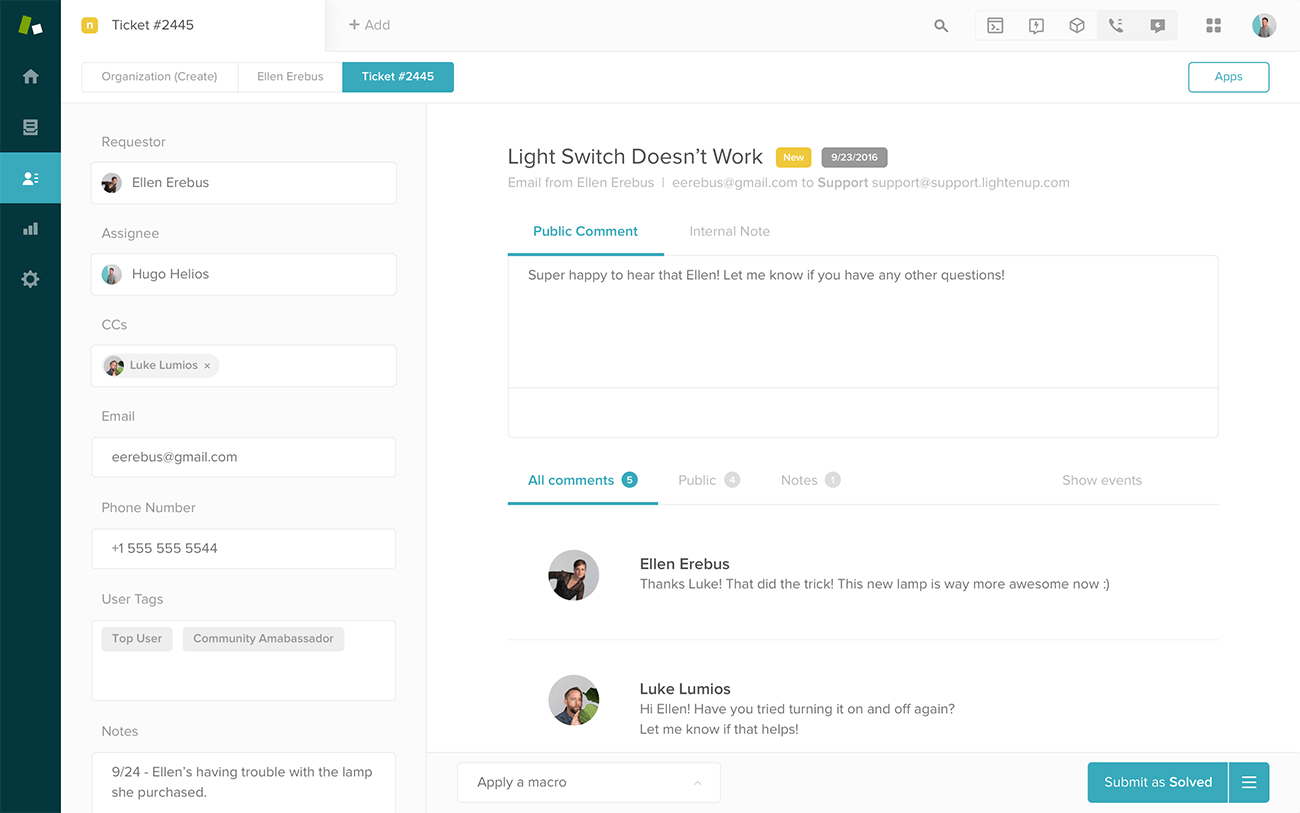
Freshdesk
Freshdesk is among the most popular ticketing software solutions out there. It is a feature-packed system that can easily adapt to any organization. What’s great about this piece of tech is its multichannel capability, support tickets, and shared team inbox. The customer service platform also allows you to create custom labels, as well as it can manage different customers with similar issues in one place.
Aside from the abovementioned functionality, this helpdesk ticketing system can easily draw information from phones, emails, social media, and even chats into one live document. This makes managing processes much faster and more convenient. Their pricing model is pretty flexible. For small teams of up to 10 agents, Freshdesk offers a free plan to check whether it's suitable for your company. But if you want more advanced functionality or need more available agent seats, you can select from paid tags starting at $15/agent/month (billed annually).
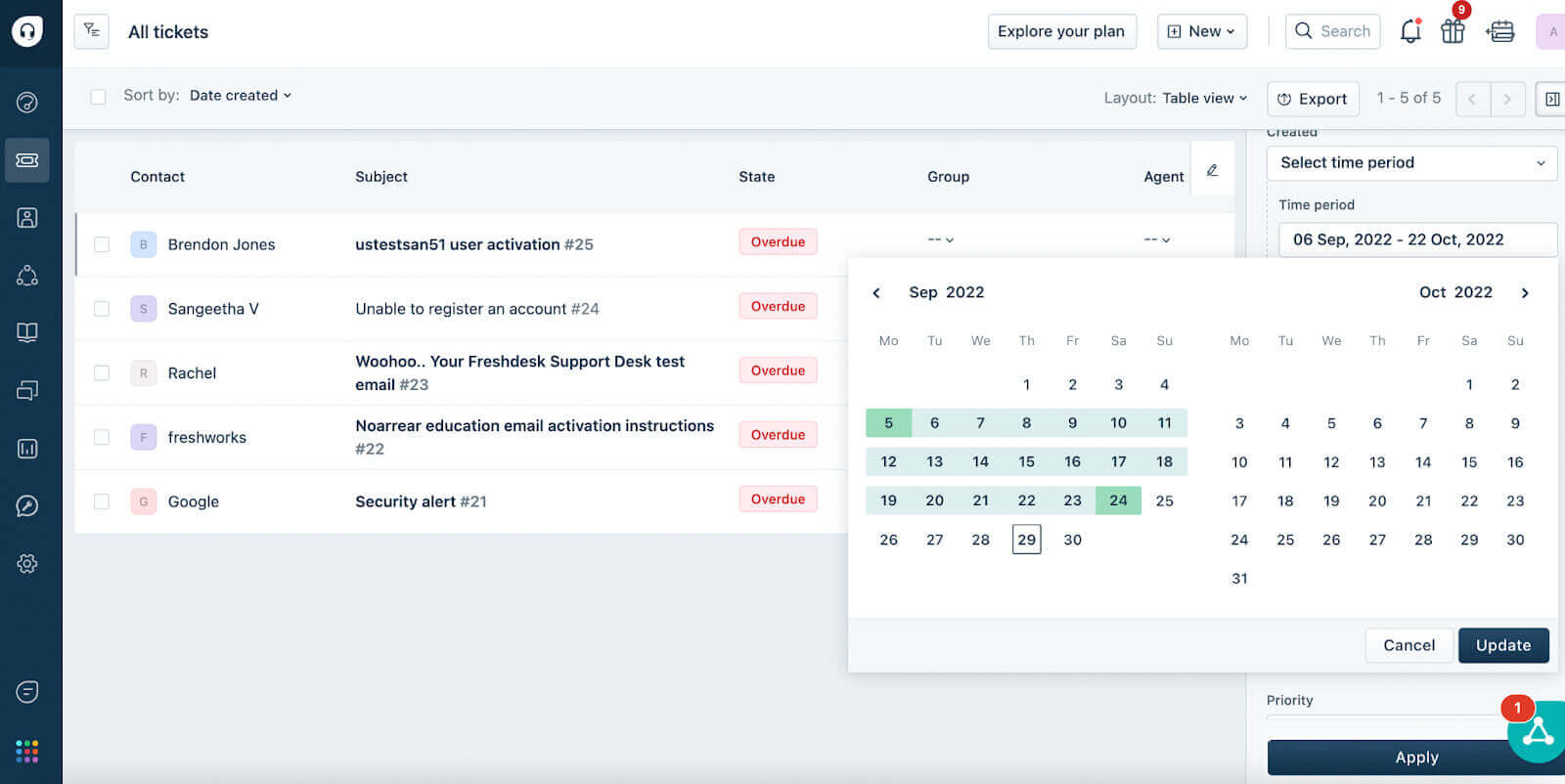
Jira Service Management
Created by Atlassian, Jira Service Management is all about quality. The key takeaway from this support ticketing system is that it does not have a huge set of features, but those that are there are refined beyond perfection. The company's main objective is to provide end-to-end software solutions to enhance customer service. It was made in a way that lets you connect with your customers effectively and efficiently. Speaking of efficiency, every function is blazingly fast, and never in our testing it failed us.
With more than 15,000 organizations using it, it is no wonder that Atlassian focuses on quality. With it, you can automate a myriad of tasks, as well as gain analytical data in just a few clicks. The best part of this service desk tool, however, is its compatibility system. You can connect Jira Service Management to 1,800+ add-ons from the Atlassian Marketplace. You can also self-host it in case cloud-based isn’t your thing. This ITSM tool offers a range of pricing tiers and is reasonably priced for the functionality proposed. At the same time, it provides a free plan for up to 3 agents. You can explore the benefits of the advanced plans with a 7-day free trial of the Standard or Premium plan, as well as opt for the on-demand product demo variant.
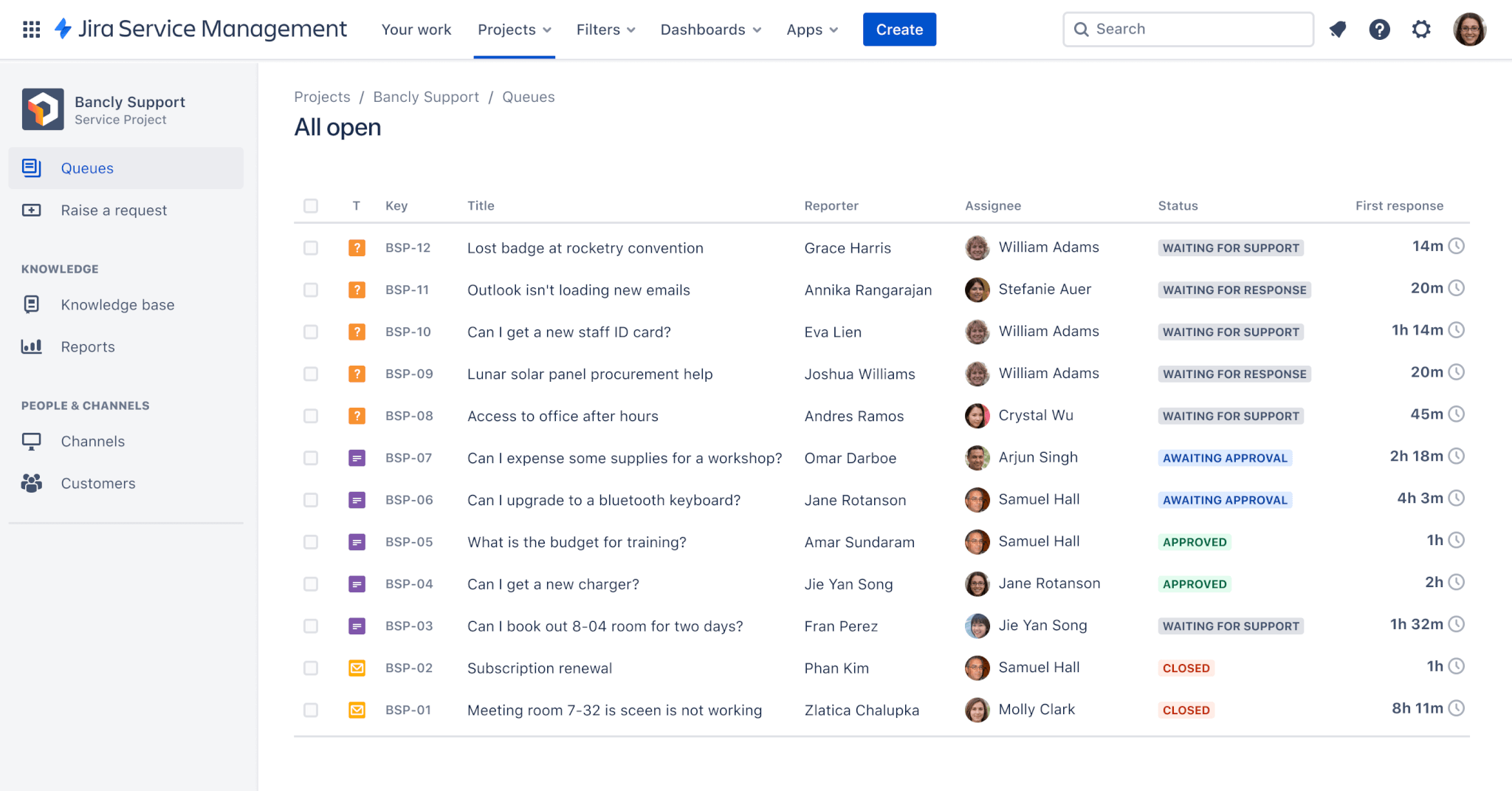
Salesforce Service Cloud
Salesforce Service Cloud is a stylish-looking service desk with every major feature a help desk should have right out of the box. It was designed to provide quality, on-demand service, and it usually delivers. The performance was good, and we never had trouble looking up data. It has a dedicated knowledge base system, is constantly evolving, and has a few automation options.
When choosing this platform, you should keep in mind that if you have a small team, prices for advanced plans are a bit costly. Tariffs vary from $25 to $500 per agent per month. Still, Salesforce is a scalable solution that offers unique feature packages for every next tier. All features include advanced options that will ease gathering feedback, analyzing trends, and tracking burnout rates.

Zoho Desk
Zoho Desk has been at the forefront lately, and for good reasons. The company has been dishing out monthly high-quality updates and introducing new features that aim to accelerate workflow. The great thing about Zoho Desk is that it does not have redundant features and is very simplified. For some, this might be a deal breaker, but their pricing is very affordable, and they even offer a free tier for those who want to try out the customer service system in advance. The help desk platform can be self-hosted, and the ever-increasing knowledge base makes it a good choice for businesses that sell intricate products.
Another cool feature of this help desk platform is that it has a smartphone version/companion app. It mimics the full experience and has a few cool features that can help your agents look up information much faster. You can answer and make calls with one click in Zoho Desk while having all the necessary customer information in front of you. With interactive voice response, customers can quickly get support from the right agent. And finally, for $7 per user/month, you get practically everything you might need to get started. Those who want a premium experience can opt for the $14 user/month plan, which is only twice the price of the starter plan.
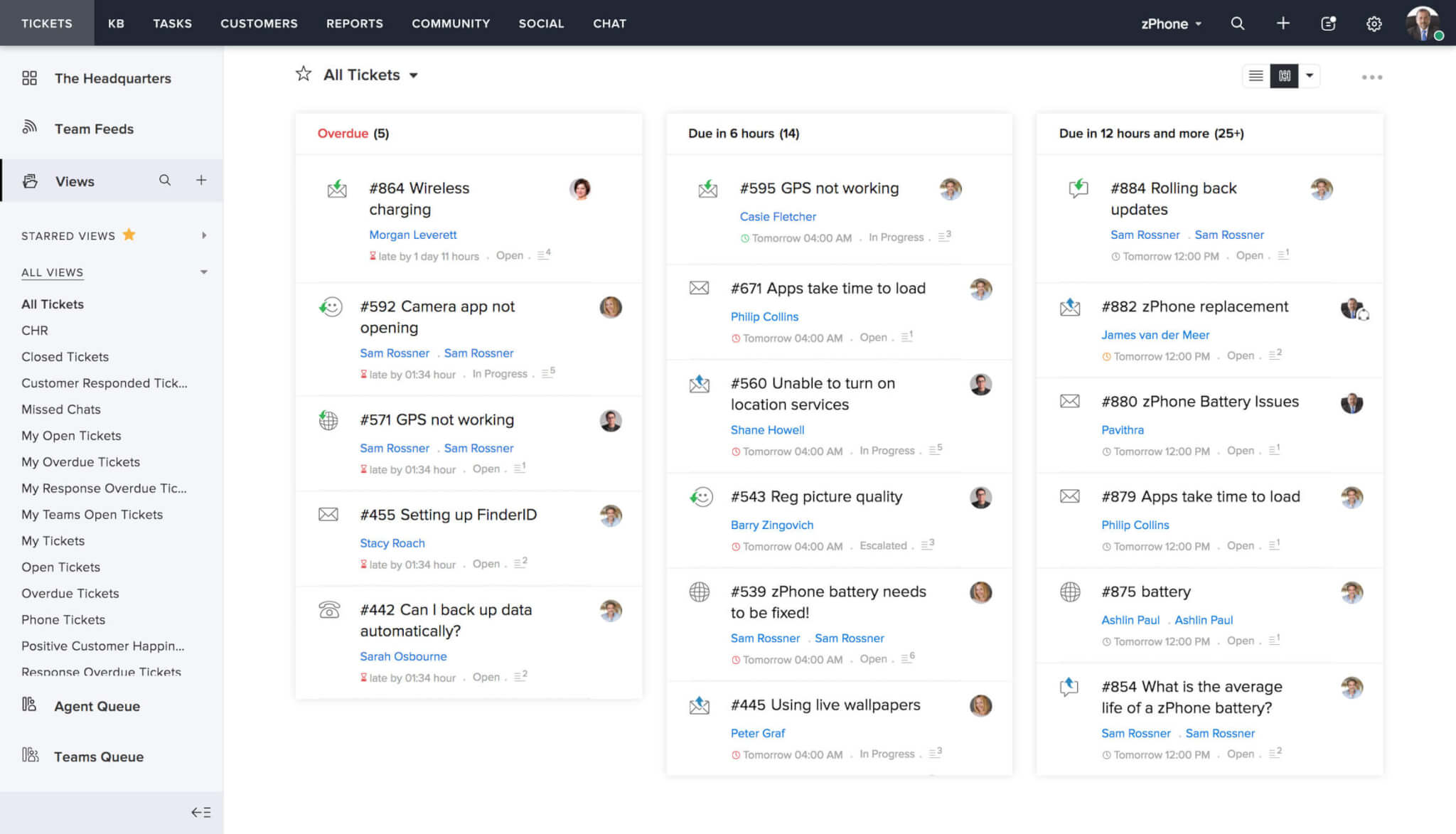
Intercom
Intercom has been in the helpdesk industry for a while now. They have created a positive reputation for providing a feature-rich solution for small and large organizations. From ticket management to enhanced chat systems, there’s a lot to love here. As the name suggests, Intercom focuses on communication, and it’s reflected in its messaging app.
It's one of the best communication tools we’ve used, as with it, you can not only serve existing customers but acquire new ones. It has omnichannel support, tons of integrations, and customizable bots that can answer questions immediately. The main drawback is that their knowledge base isn’t as updated as their other products. Another issue stems from the pricing. Their Essential plan costs $39, and the most advanced Expert plan is priced at $139. Yet, if you work in eCommerce, you might want to use it as the bot is too good to ignore.
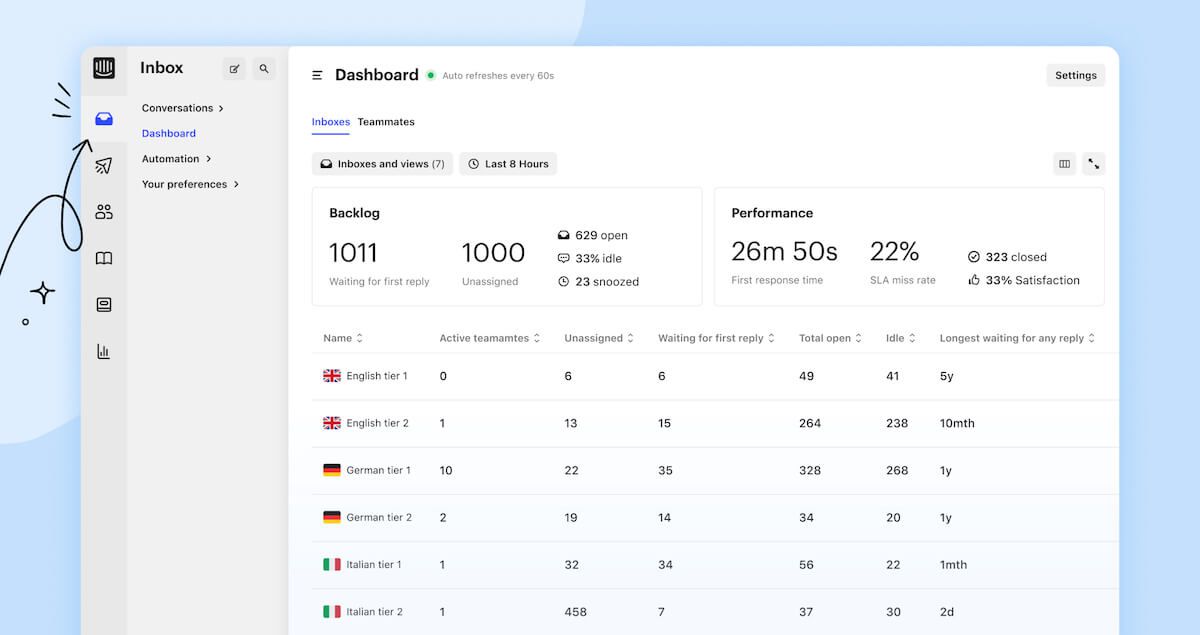
Hubspot Service Hub
Hubspot Service Hub is a modular help desk system designed to help agents engage with new and existing customers. The three main modules of the system were designed to collect customer feedback, create and update the knowledge base, and manage tickets. With these modules, you can qualify and quantify customer service, as well as reach new prospects much faster.
The customer service platform also has a nice dashboard system and a few automation options. Like Zoho Desk, the company provides a phone version of their app that can be used on every major platform, including iOS, Android, and even now-defunct Windows Phone. Thanks to the open API, all data from the mobile version can be retrieved and synchronized with the desktop version. Lastly, the help desk system has several SEO features to help you promote your product/service. As for the prices, they are quite expensive. The starting plan is $90 and the top tier is $130 per month per seat.
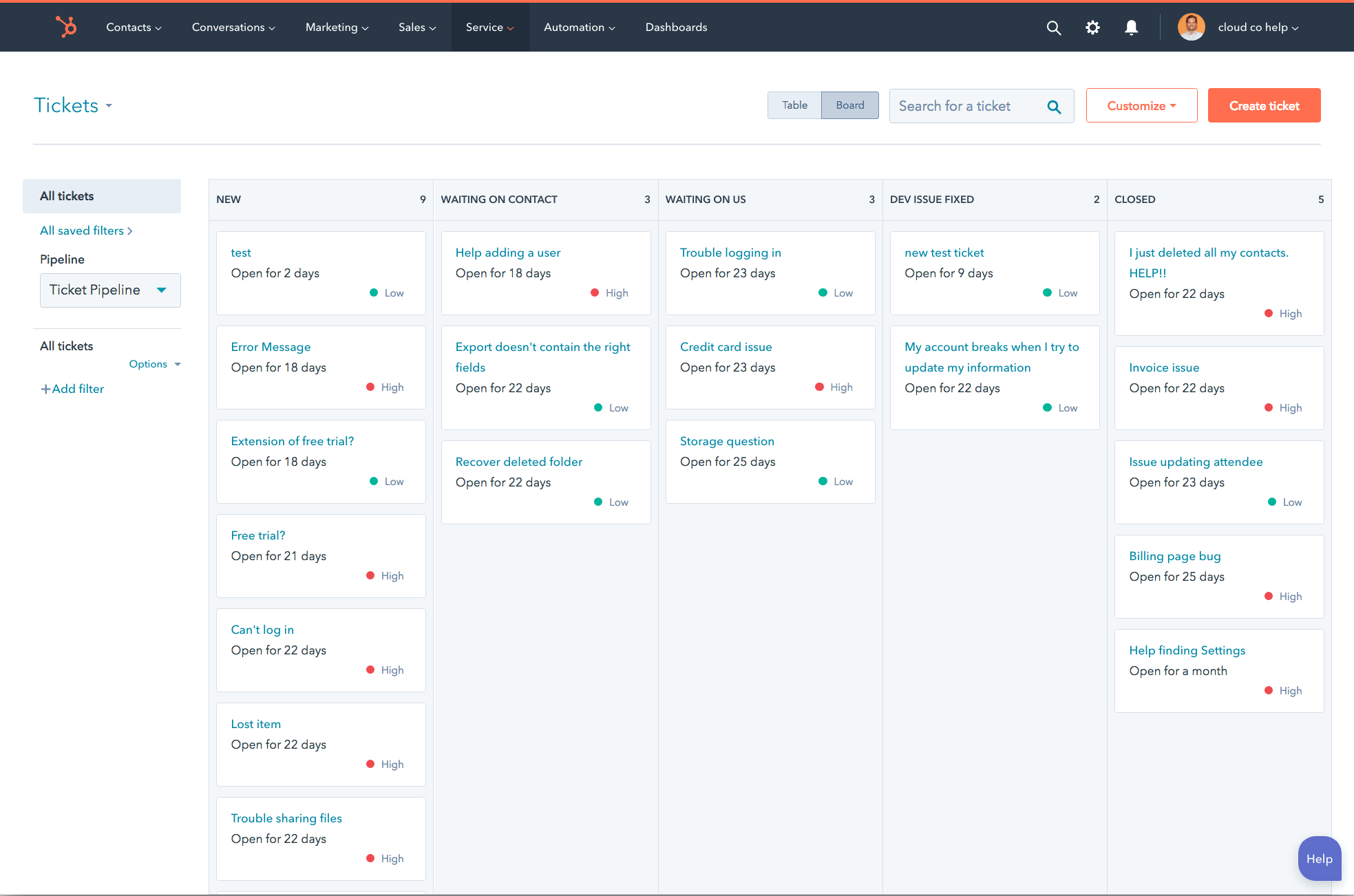
SolarWinds Service Desk
Built with IT companies in mind, SolarWinds Service Desk is a service desk software engineers love. It has a plethora of different tracking options, analytics, and ticket management. But it’s not just about IT. SolarWinds Service Desk is a Swiss army knife that will suit any company regardless of its activities. The key advantage it has over the competition is its data-gathering mechanism. Unlike other customer service tools, once you install Samanage, all your data will be collected automatically once users fill in the required spaces. This allows you to organize work much faster and reach new customers with more efficiency.
The help desk platform is also very fast and can process data in the background while doing other operations. As for the pricing, the service desk system isn’t too expensive, and the starter plan will cost you around $39 per user/month, whereas the premium one, dubbed Premier, is only $99. Do keep in mind that the company only offers a trial, and there is no free option.
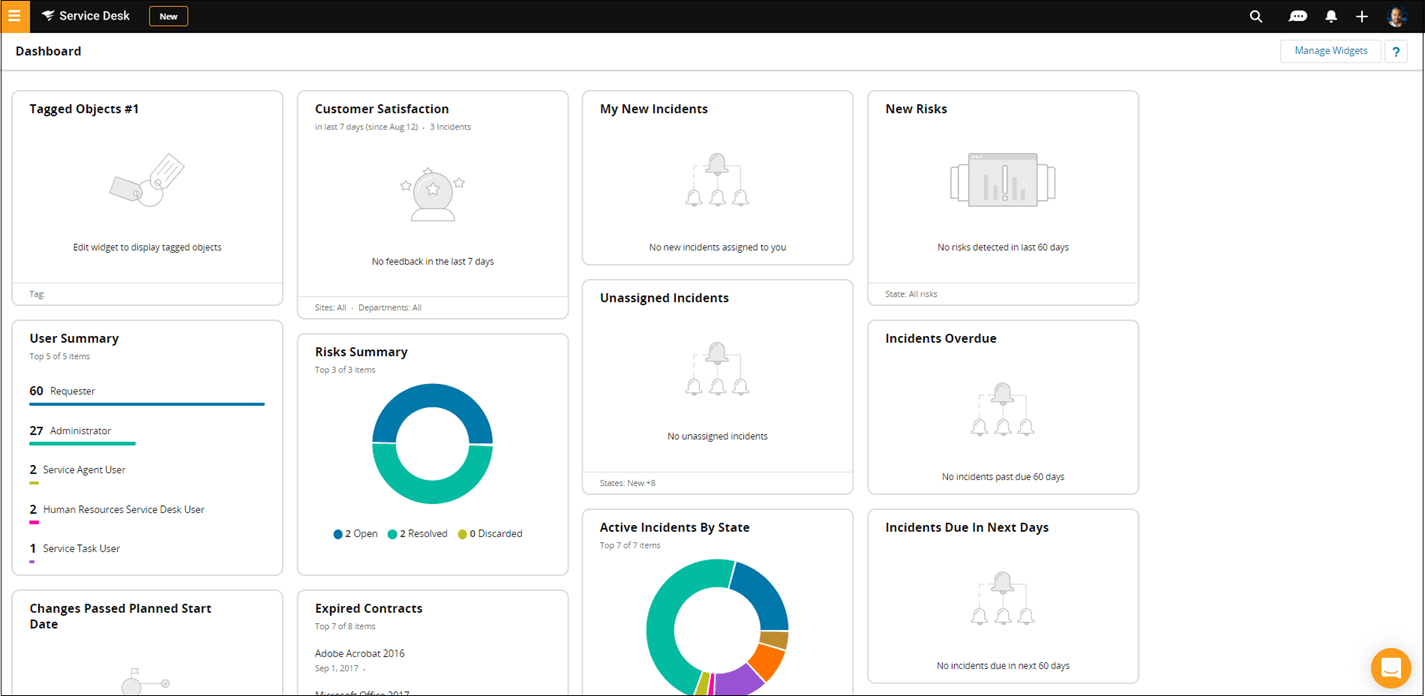
Help Scout
If there’s one thing sure about Help Scout, it is that it never fails when it comes to customer feedback. As you might have guessed, this service desk was built with data collection and customer interactions in mind. All features have a form for data gathering and this is exactly what separates it from the rest of the competition. Essentially, with this helpdesk system, you will get feedback regarding all sorts of things, from consumer experience to shipping method, and you will know exactly how your customers feel about the whole process.
Another focal point of the customer service system is that, as developers would say, it's about customers and not tickets. What it means is that you do get tickets; it's just that they will be presented in a way that your customers would like. All tickets are tied to a specific agent who can interact with customers directly using a live chat. When it comes to pricing, the standard plan is affordable, clocking at $20 per user/month. The medium one is a tad more expensive at $40 per user/month. If you want something more premium, there is a Pro plan that costs $65 per user/month. Otherwise, you are limited to just these two options.
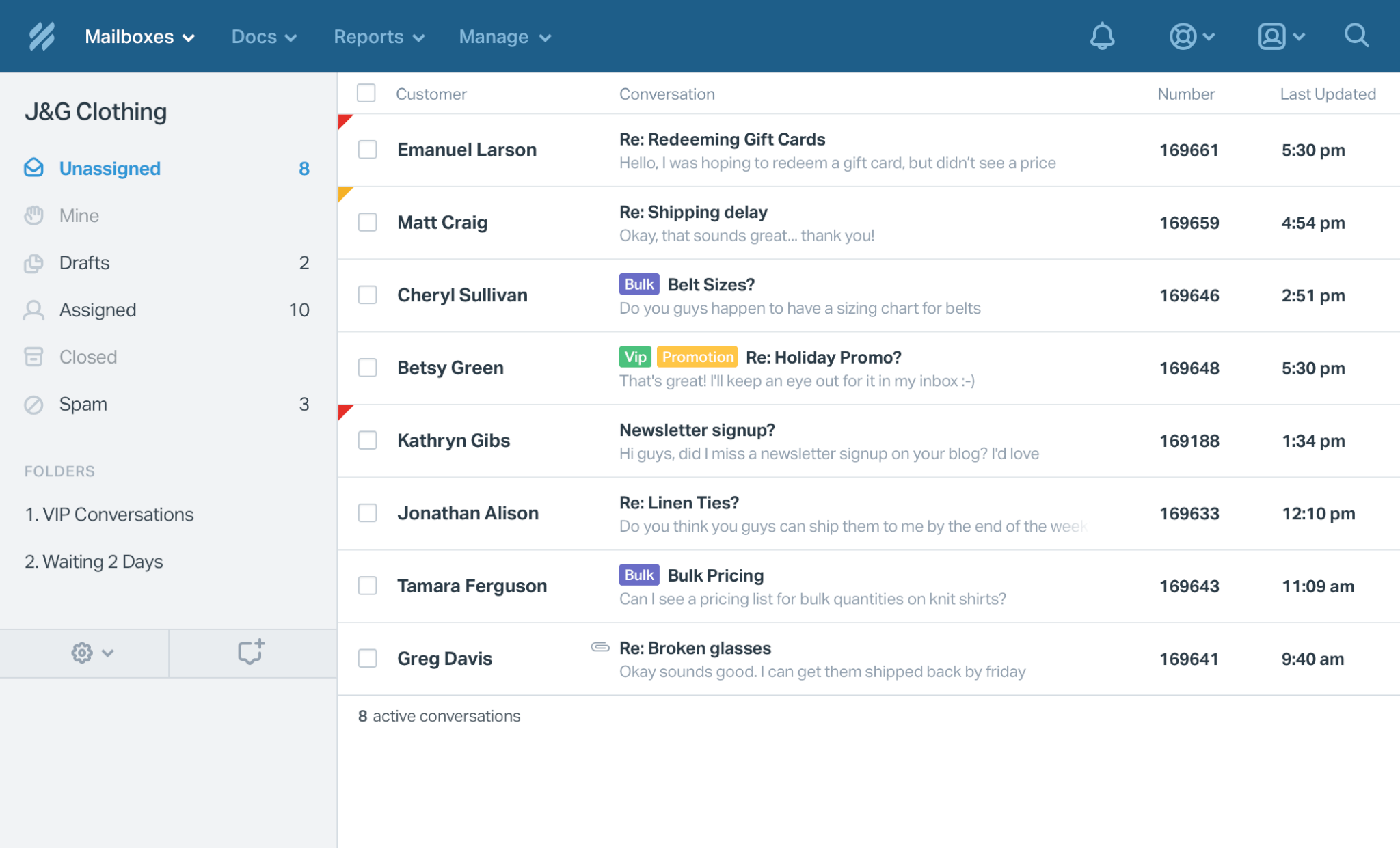
Kayako
Kayako is all about branding and delivering exceptional customer service experiences. This is clearly reflected in their functionality, as it allows you to manage multiple brands simultaneously. As for customer service, you get chats, ticket management, reporting, and a feedback system. When it comes to performance, the help desk system's good and gets the job done. Some features might need fine-tuning but other than that, no complaints.
It is worth mentioning that with Kayako's live chat tool, you can deliver a personalized and connected customer experience 24/7 across all channels—all from the Kayako dashboard. The company offers two service plans: Kayako Cloud and Classic On-Prem. The first one is a cloud-based customer service solution for small and growing teams, with a minimum seat number of 5. It also provides free collaborators. In comparison, the Classic On-Prem plan offers customer service software for large teams and enterprises, where a minimum number of seats is 10. This includes Kayako plus Engine Yard (a priority On-Prem partner). You can test any Kayako plan for free within 14 days.
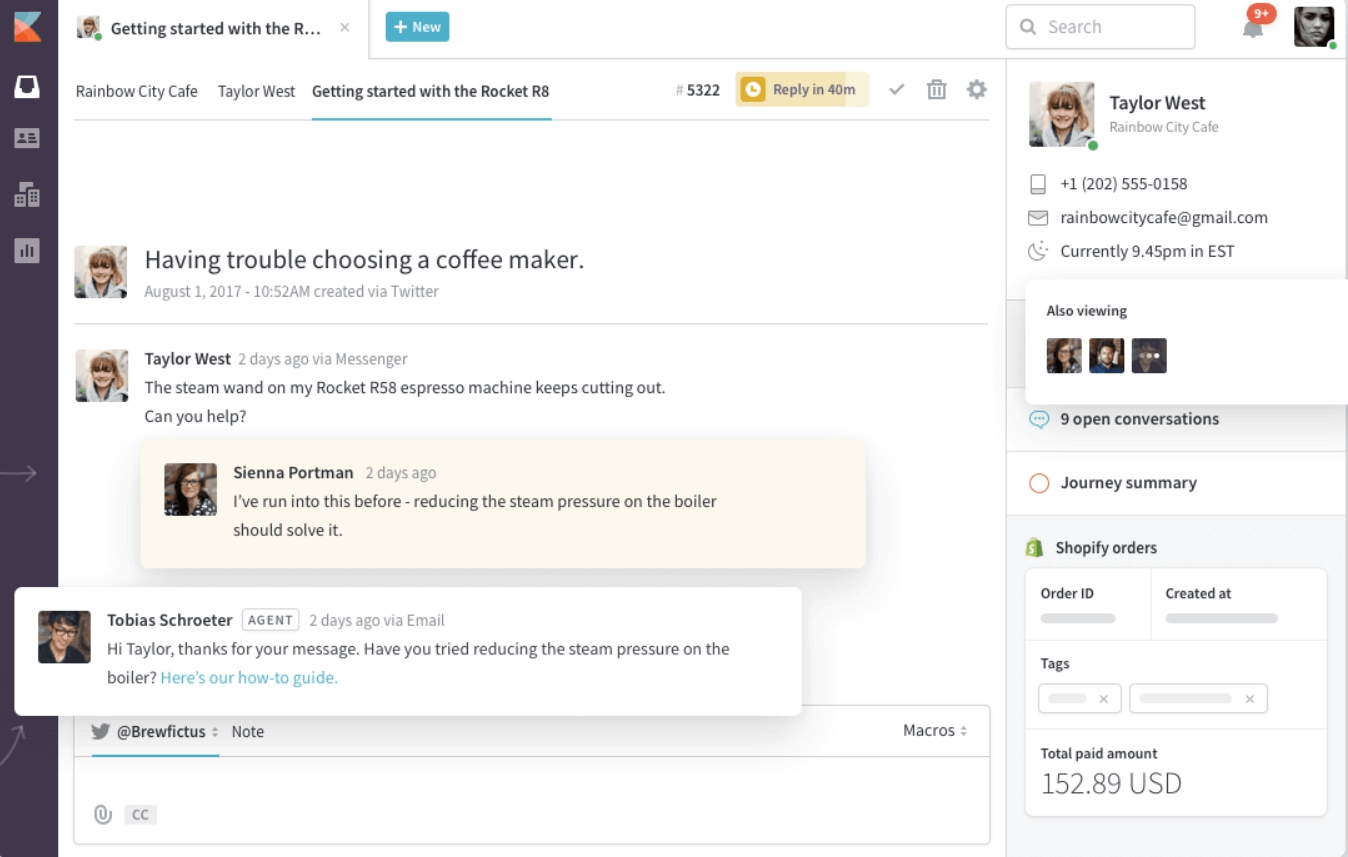
ServiceNow
ServiceNow stands out as a robust and highly scalable platform designed to streamline IT service management and customer support processes. Its extensive suite of features includes incident management, problem management, change management, and more. With its cloud-based architecture and AI-powered automation capabilities, ServiceNow caters to enterprises of all sizes.
The nice thing is that it is available for desktop and mobile devices. Pricing varies based on the specific modules and customization required, making it suitable for diverse organizational needs with ITSM Standard, Professional, and Enterprise options. Their license fee starts at $100 per user/month. In addition, you can talk to a ServiceNow representative to get on the path to a custom quote.
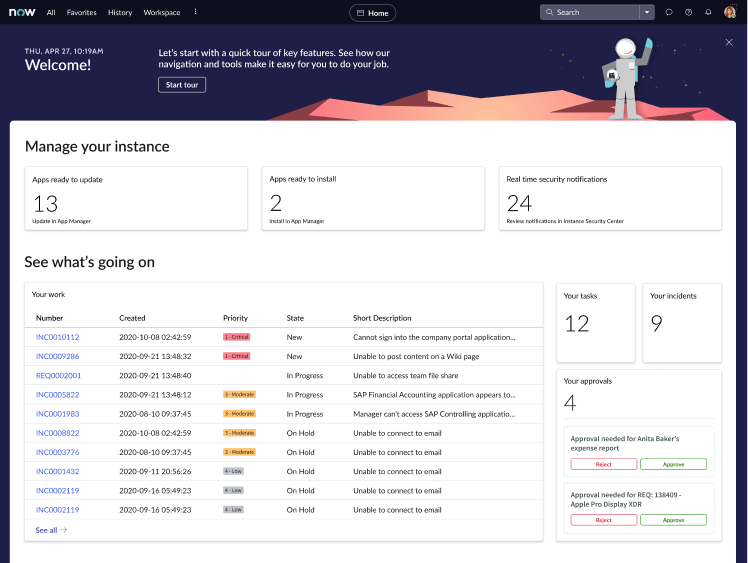
TeamSupport
TeamSupport is a B2B-focused help desk platform designed to streamline customer support operations for businesses dealing with complex products or services. Its collaborative features, including shared ticket visibility and internal communication tools, enhance team productivity and efficiency. With customizable workflows and integrations with CRM systems and other business options, TeamSupport offers a tailored solution for companies seeking to deliver superior customer experiences.
This help desk solution allows staff to collect valuable customer information in one intuitive dashboard easily. TeamSupport offers three pricing tiers. The Essential Support tag includes basic ticketing and chat for growing teams at a cost of $35 per agent/month. The middle option, the Professional Support tag, is fully customized and includes advanced functionality at a cost of $49 per agent/month. The top option, the Enterprise Support tag, offers enterprise-level chat and tickets, advanced reports, and customer service analytics.
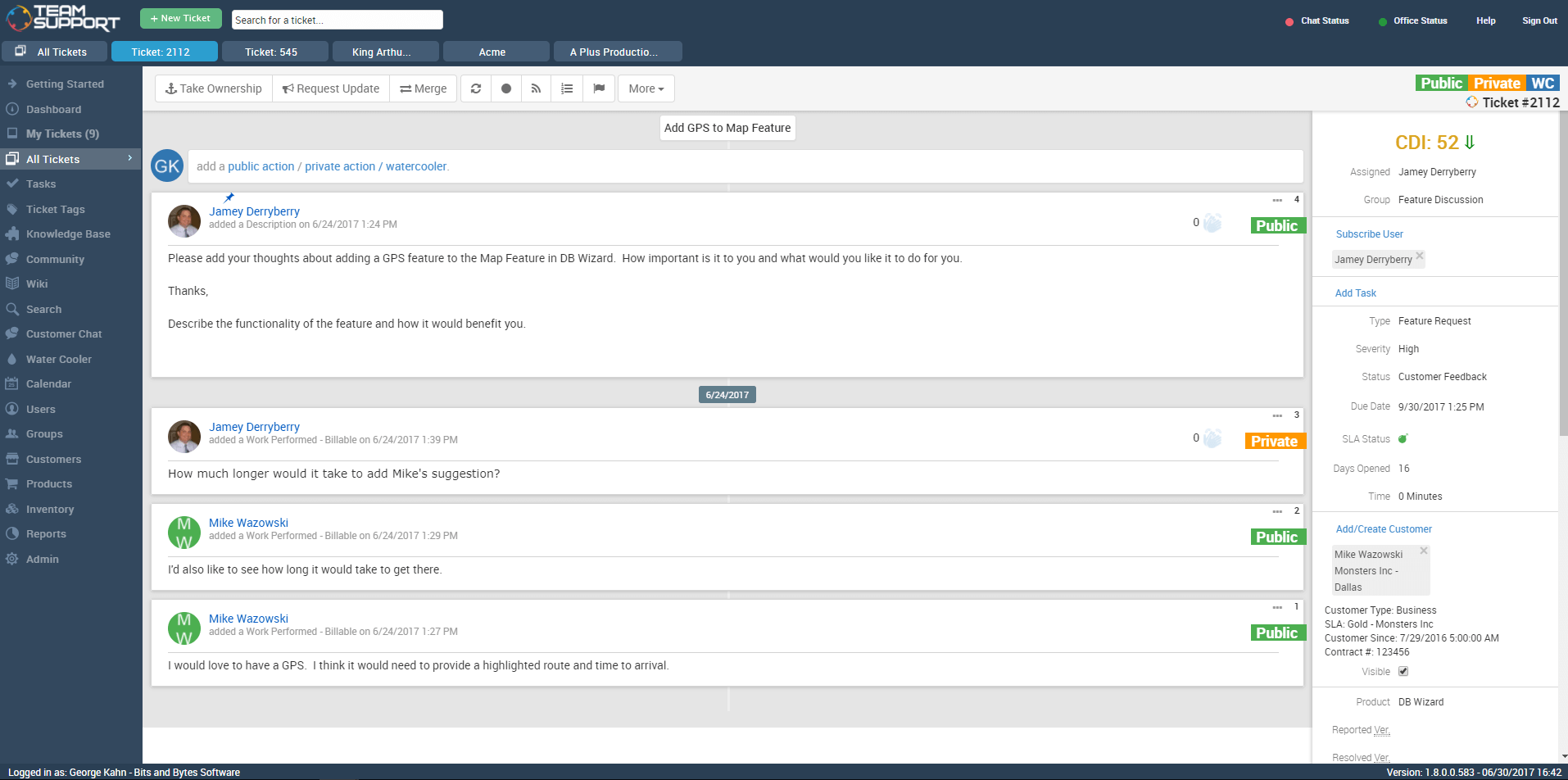
LiveAgent
LiveAgent is an all-in-one help desk platform that combines ticketing, live chat, and social media integration to provide seamless customer support across multiple channels. Its intuitive interface and customizable automation features enable organizations to streamline their support processes and improve agent efficiency. It is worth noting that LiveAgent enables users to create fully customizable knowledge bases and customer portals. Additionally, it is available for Android and iOS to deliver customer service on the go.
LiveAgent offers 5 cost-effective solutions for businesses of all sizes. You can choose from a free account with some limitations to a full-scale solution with extra support and exclusive services in the Enterprise tier. The first of the paid options is the Small business plan, which costs $29/agent per month, while the Enterprise plan costs $69/agent per month billed annually. If you are just starting your business, you can take advantage of the LiveAgent Startups Deal. The company provides 2 months free if you choose the annual billing option.
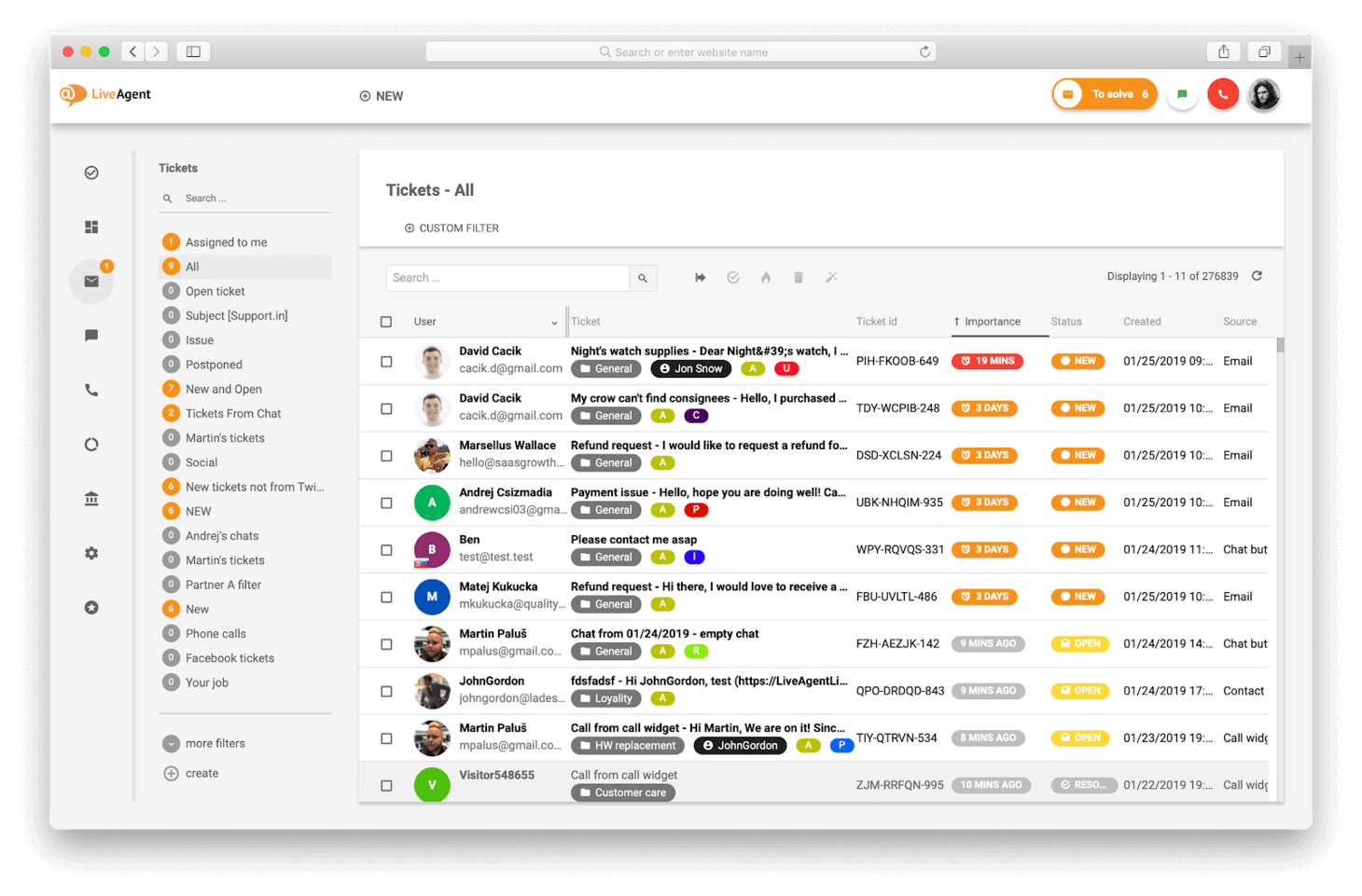
GrooveHQ
Groove is a simple yet powerful help desk platform designed for small to medium-sized businesses. Its intuitive interface, email ticketing system, and knowledge base functionality make it easy for teams to manage customer inquiries and provide timely responses. This customer support solution allows you to sort tickets based on your preferences and create custom reports that cover small companies' needs.
It's worth noting that this help desk tool is ideal for teams that rely mostly on email for customer support. Groove's customer support team is characterized by efficiency and helpfulness. Pricing is transparent and affordable, with plans starting at $4.80 per user/month and scaling based on the number of shared inboxes with email, live chat, social channels, knowledge bases, and additional features required.
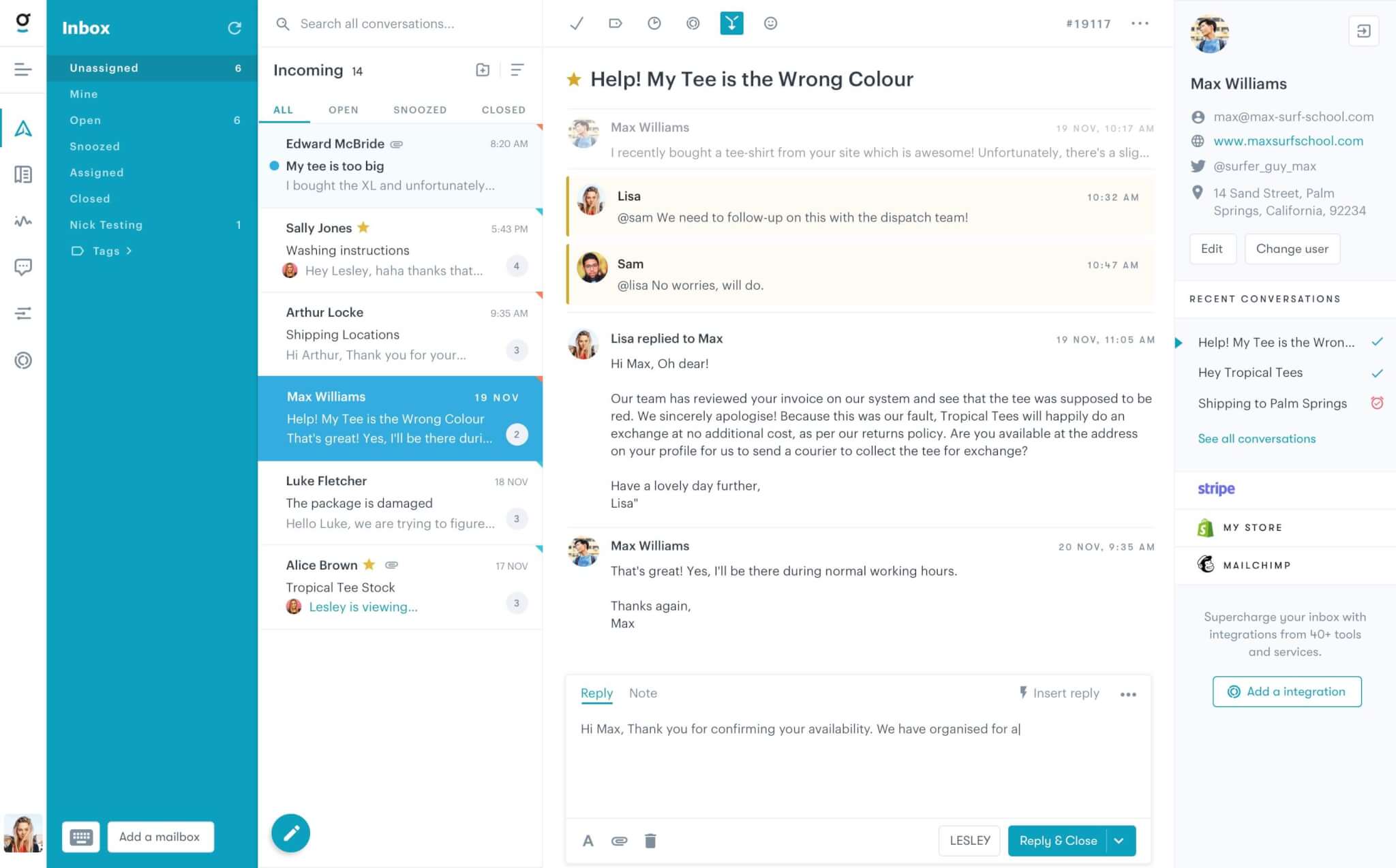
HappyFox
HappyFox is a cloud-based help desk platform that offers a range of features, including ticketing, knowledge base management, and reporting and analytics tools. Its intuitive interface and customizable workflows make it easy for teams to manage customer inquiries and track performance metrics. With HappyFox, you can easily set a due date and time for each task, assign tasks to individual agents, create task templates, and reuse them on tickets.
This knowledge management solution allows you to search for questions, offers automated suggestions, and shares information on social media. Its foundation is customer feedback, which lets you measure customer satisfaction and drive product or service improvements. HappyFox's pricing is competitive, with plans starting at $29 per agent/month and scaling based on the number of agents and additional features required. All plans require a minimum of 5 help desk agents. Also, HappyFox offers discounts for non-profit and educational organizations.
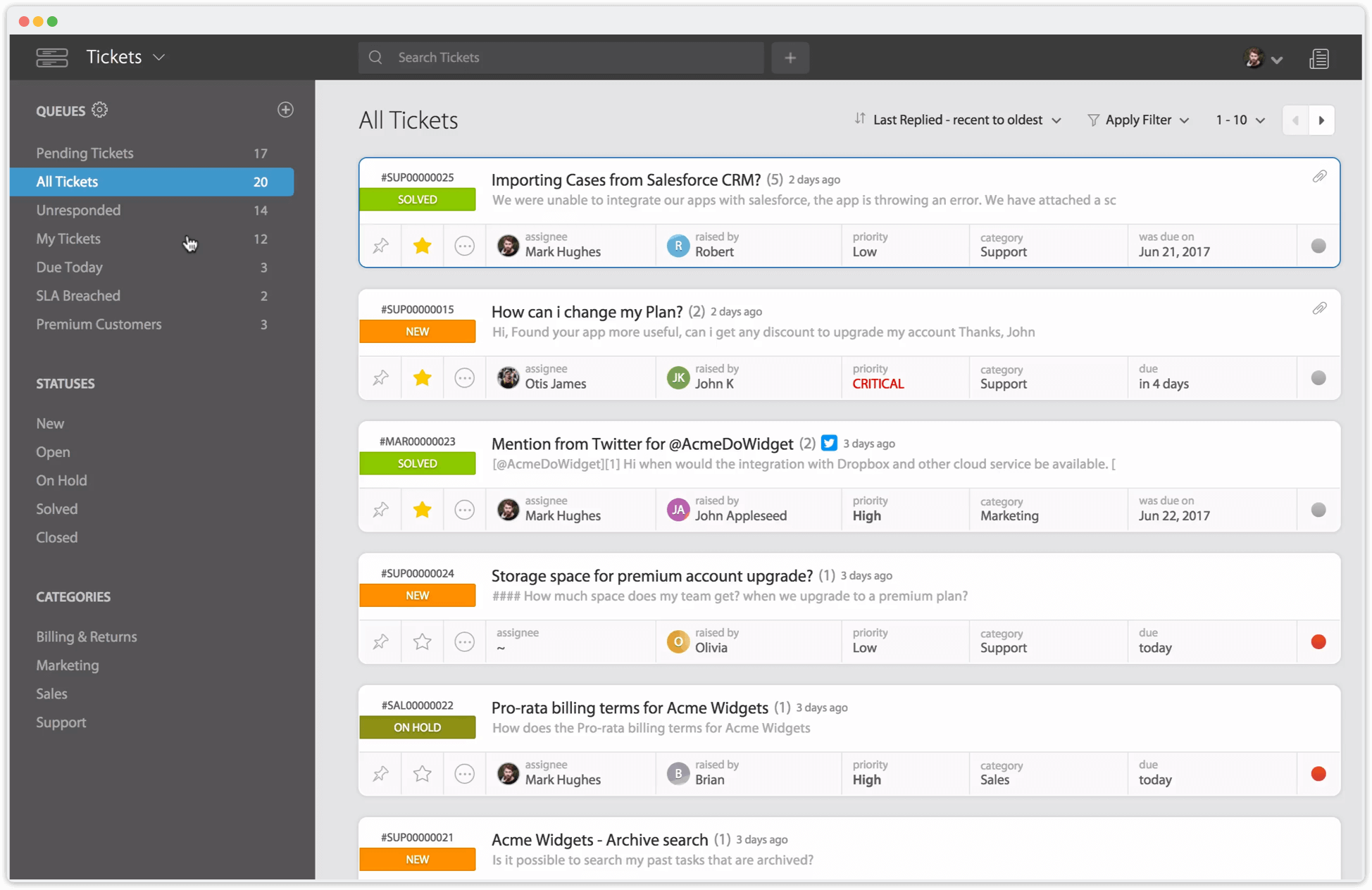
Helpshift
Helpshift is a mobile-first help desk platform designed to streamline customer support for mobile apps and games. Its in-app messaging, knowledge base, and AI-powered automation features enable organizations to provide personalized support experiences directly within their apps. It also offers chat help, custom bots, and self-service options. For analytics, you have access to metrics for each application by issue type, scope, and team performance, allowing you to track open issues, tag reports, and improve CSAT results.
It's fair to say that Helpshift is an excellent option for companies that focus on supporting mobile app users and want to optimize service workflows for mobile environments effectively. Helpshift's pricing is based on usage, making it a scalable solution for businesses of all sizes. Feedback+Plan tier is free and includes 250 free feedback submissions per month. Paid options start at $150 per month for the Starter plan option.
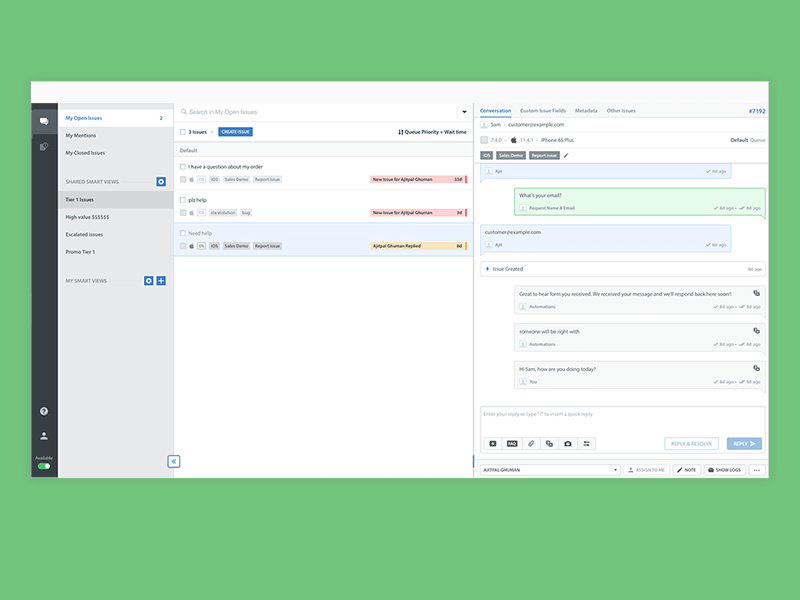
Gorgias
Gorgias is a help desk platform specifically designed for e-commerce businesses. Its integrations with Shopify, Magento, and other e-commerce platforms enable organizations to provide seamless customer support directly within their online stores. The helpdesk offers robust omnichannel capabilities that allow you to seamlessly manage customer requests from different channels within a single platform.
It also offers valuable functionality, like team collaboration tools and shared ticket views, macros and rules for automation, and a full set of reporting and analytics features. Gorgias's pricing is based on usage and scales with the number of tickets and additional features required. You can choose one of 5 tariff plans, from the Starter plan for $10 per month to the Enterprise tariff plan.
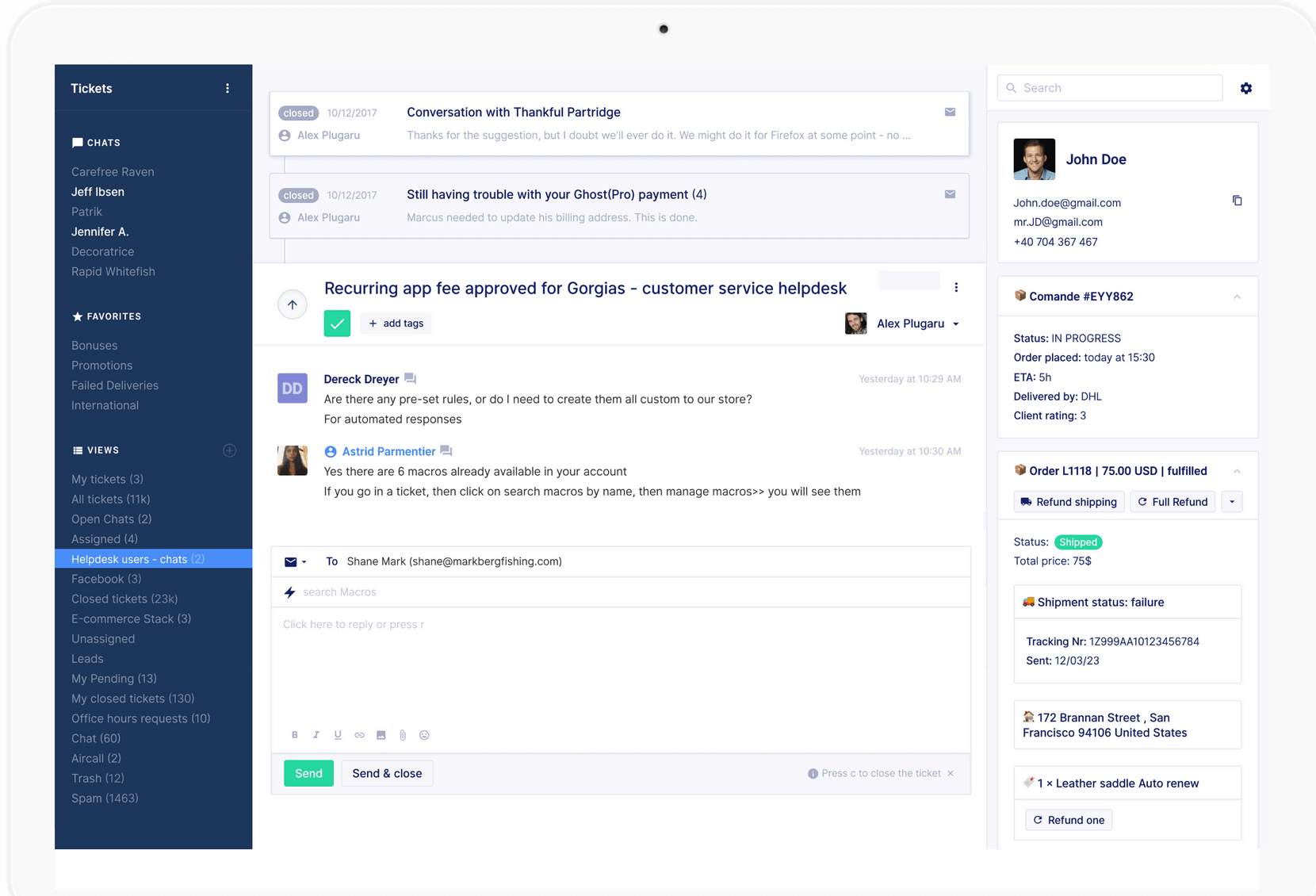
Final Thoughts
This concludes our list of 2024 best help desk software solutions. While our list aims to provide insights into some of the leading options, the ultimate choice rests on aligning the features and pricing with your organizational requirements. And if you're considering migration, our data migration service can seamlessly transfer all your data with just a few clicks. Sign up for a free trial here and see for yourself.



